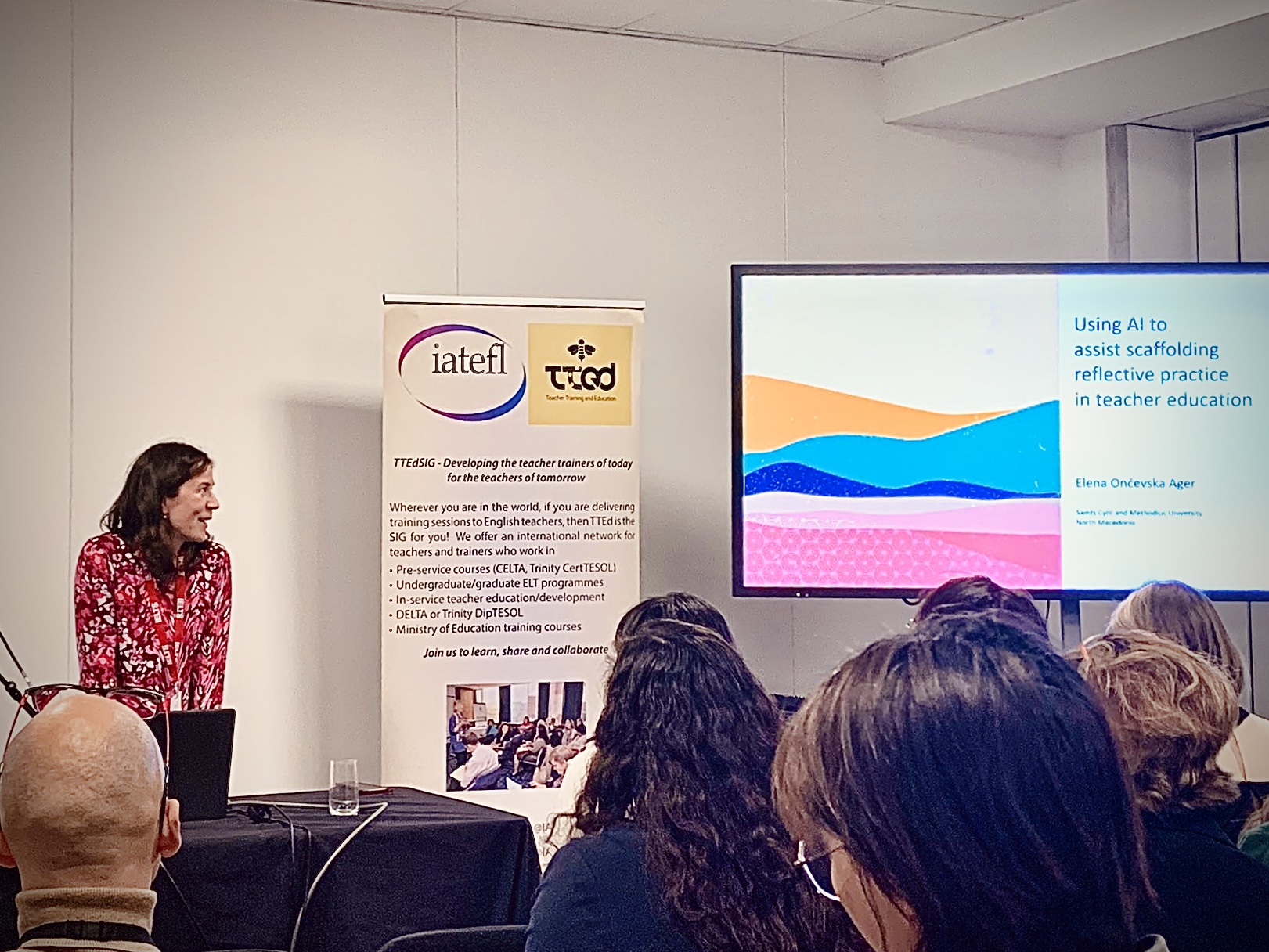
IATEFL 2024 in Brighton
Posted on 25th April 2024 by Elena Oncevska AgerCover image from original by @JessBCN
Using AI to assist scaffolding reflective practice in teacher education
Supporting informed reflection in teacher education can be time-consuming, especially when working with
large groups of student teachers. Can AI act as an assistant in the process of scaffolding meaningful
reflection?
In my talk on 17th April 2024, I analysed transcripts from my pre-service teachers’ engagement with AI and
discussed the affordances and challenges involved, as well as the implications of AI-scaffolded reflection
more generally.
My talk was set in a university teacher education (TE) setting, where I work with large groups of EFL pre-service teachers (PSTs). On their practicum, the PSTs collaborate with school-based teachers who act as their mentors, supporting their planning, teaching and reflection.
Reflection is central to teacher learning as it allows teachers to consolidate their past learning and build on it in informed ways. Yet, school-based mentors are not always able to find enough time in their busy schedules to support the reflective processes of multiple assigned PSTs. In this talk I posed the following question: (how) can AI be used to assist mentors, and teacher educators more generally, in scaffolding reflective practice?
The mentoring protocol my PSTs use is Systematic Informed Reflective Practice (Malderez, 2015; 2023). This protocol was developed to gradually scaffold teacher learning by allowing the mentee to lead on the process of making informed sense of their teaching. The role of the mentor is mostly to listen and get involved if and when invited, withholding any judgements so as to avoid judgementoring (Hobson and Malderez, 2013). It can be said that this stepped, mentee-led reflective process lends itself well to being moderated by AI.
When it comes to scaffolding PST reflection, Noticing was particularly successful at Step 1 of SIRP, where PSTs typically offer limited descriptions of what they noticed, e.g. "First day helping out (my school-based mentor) and it went well". Eliciting details of what got noticed prompts the PSTs to be more vigilant about what goes on in the classroom, notice more and notice better, and come to the conversation well-prepared so Noticing doesn't have to elicit too much. Another part of SIRP where Noticing came in handy was Step 3, i.e. what the PSTs already know about the issue being discussed. The PSTs typically gave over to Noticing at this point, which is well-placed to help as it has access to a carefully curated body of knowledge about education, all relevant to the module at hand. Some PSTs were curious to find out more about the knowledge suggested by Noticing, which led to deeper PST engagement (e.g. PST: How may these concepts be applied to my observation?) and new insigths (see slides 13-15 above). Students' feedback was generally positive, as suggested by their feedback in the app and by the sentiment analysis of their chats (see a typical such analysis on slide 17).
I also used Noticing for training mentors to use SIRP. This was an opportunity for the mentors to act as mentees and have first-hand experience of the non-judgemental mentoring they were preparing for. Many were positively surprised by its potential to elicit rich thinking, thus helping them arrive at their own, informed judgements. This, for some, had a therapeutic effect. Some mentors, on the other hand, were put off by some of its repetitive questions. We subsequently realised that this was due to the AI overzealously following our initial prompts, which we then adequately adjusted.
To summarise, my initial insights from using Noticing with my PSTs and with mentors are that Noticing elicits rich noticing and deep reflection (deeper, for e.g., than reflecting on one's own). It encourages teachers to exercise their agency in arriving at their own, informed decisions. Finally, since teachers tend to discuss in Noticing classroom episodes that have prompted an emotional response in them, Noticing becomes a safe place for them to vent, and leave each chat with a feeling of calm and purpose. This is all, provided, of course, that reflection is taken seriously, with teachers alloting sufficient time for the exercise (approx. 30 mins) and actively seeking to develop, i.e. not simply going through the motions.
By looking at transcripts from my PSTs’ engagement with AI, I discussed with the audience my initial insights about the affordances of and challenges in using AI as an assistant in scaffolding reflective practice. This project may have implications for supporting learning more generally, i.e. beyond TE contexts.
References:
- Hobson, A. & Malderez, A. (2013). Judgementoring and other threats to realizing the potential of school-based mentoring in teacher education. International Journal of Mentoring and Coaching in Education, 2(2), 89-108.
- Malderez, A. (2015). On mentoring in supporting (English) teacher learning: Where are we now? In D. Hollo, & K. Karoly (Eds.), Inspirations in foreign language teaching: Studies in language pedagogy and applied linguistics in honour of Peter Medgyes (pp. 21-32). Harlow: Pearson Education.
- Malderez, A. (2023). Mentoring teachers: Supporting learning, wellbeing and retention. London: Routhledge, forthcoming.
Written by Elena Oncevska Ager
Written by Elena Oncevska Ager
Elena Oncevska Ager is Full Professor in Applied Linguistics at Ss Cyril and Methodius University
in Skopje, North Macedonia.
Her work involves teaching English for Academic Purposes (EAP) and supporting the development of English
language teachers, in face-to-face and online contexts. Her research interests revolve around EAP and
language teacher education, with a focus on mentoring, group dynamics, motivation, learner/teacher
autonomy and wellbeing.
Elena is particularly interested in facilitating reflective practice, in its many forms, including
through using the arts and by using AI to facilitate it. Her investigations are designed in such a way
as to inform her practice of supporting learning and teaching.